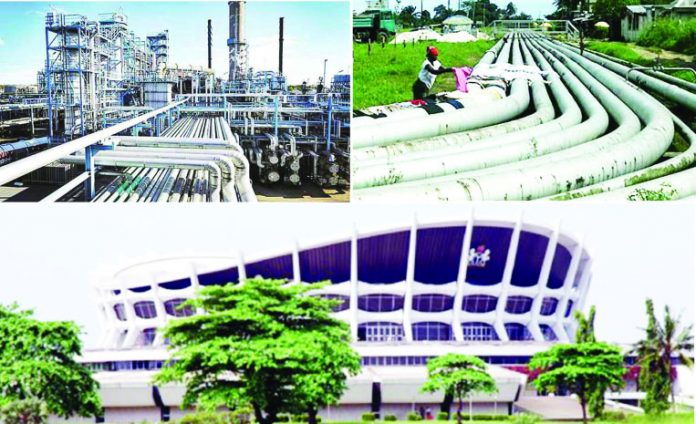Trending now is the issue of national assets which the government has proposed to dispose of, to raise money to fund the national budget especially in the area of infrastructure development. As expected there is a major divide leading to two vocal groups of those who say yes and those saying no. Even at the national level and within otherwise coherent groups this division is real. In the newspapers this Monday, October 3, it was reported that during an ordinary courtesy visit between governors Aregbesola of Osun state and Fayose of Ekiti state, they both stood at opposing ends (I thought a courtesy call is to harmonize views!). Yet they were members of the National Economic Council that approved the sale of national assets, that the News reports!. Of course, the majority will carry the day so there might be a minority position.
With this huge divide, it could be dangerous for people like us to stand on either side without a strong basis for doing so. Here my accounting training comes in handy. Let us go to the basics.
What is an asset?
This is a possession that can produce income now or in the future. It generates an inflow of cash. So if an asset is not producing income or will not be able to produce income in the future or even help you to produce income, it is no longer an asset. It has become a liability as it will cost you money to continue to hold it.
What is a liability?
Any item of possession that you need to service or spend money on for as long as it is in your possession. It only guarantees outflow of cash.
Depreciation:
Usually, every asset has a useful lifespan. As your asset continues to generate income or is put to productive use, it deteriorates. Yes, we can keep it moving through repairs and all of that. Productivity will decline. This is asset depreciation. It is natural and there is nothing we can do about it. The only thing is that we can take an economic decision as to whether we continue spending so much repairing an asset that has long past its useful lifespan. The economic sense at this level is to scrap the asset and replace such.
At this point, one thing we cannot dispute is that some of these national assets were once good assets but now they have transited into liabilities. Take our refineries as an example, we spent so much on it (turnaround maintenance or so) yet we import petroleum products. Even the managers NNPC declared losses from their operations. Again maybe the wise economic decision was not agreed and we keep spending so much on a fully depreciated asset. The worst thing here is that technology has changed and we have more efficient options probably at a lower cost within a 5 year period.
So when we talk about national assets let us be clear what we are talking about. What purpose do they serve – economic or national monuments? Some of these assets are even unknown to the ordinary man. Let us have a profile of them before any decision.
While discussing this the other day a passionate young man in my office felt we should not sell! Then I asked him why and when will he sell his current car? His answers were the fundamental truths. He said when the cost of maintenance is becoming too high when the car is not functioning well like before –more regular visits to the mechanic, and when there are better affordable options to buy.
These are the basic questions we all need to answer even as patriotic Nigerians. Any asset that fails the test should be sold and those that pass should be retained.
Asset Evaluation template. You can create your own!
| Assets | Exceed technical lifespan? | The cost of servicing more than income? | Better option available? |
Total Score |
Decision |
| NNPC Refineries. | Yes | Yes | Yes | 15 | Sell |
| Share in NLNG | No | No-investment | No-though ROI not known | 3 | No |
| AFC shares | No | No-Investment | Yes –build infrastructure- | 2 | No, can borrow against it. |
| Airports | No | Yes – | Yes | 10 | Sell |
Yes =5 points, No = 1 point. A higher score is a sale decision-
I have used the above example to demonstrate the need for a basic template choosing appropriate parameters to arrive at ‘sell’ or ‘keep’ decision. Even for monuments, we need to convince ourselves there is value to be derived if so kept.
The next question is who will buy a nonproductive asset from you? Why will he buy and at what price? I can answer here: the scrap dealers will buy to cannibalize and sell as scrap etc. At what price? Scrap value since they must make a profit. So selling these national assets is actually a difficult option in terms of revenue generation, but a viable option in terms of reducing public expenditure.
The government should, therefore, provide full disclosure on these assets to allow Nigerians take economic decisions rather than listening to few outspoken and privileged members of our community.
Sale or no sale we will survive this recession. Again recession or no recession we must all agree to take economic decisions at all times in respect of our national assets. We should sell an asset whenever it is no longer economically viable to keep. This will go a long way in sanitizing our public expenditure and even fight corruption. Spending money on wasting asset is disguised corruption as no return is expected.
Share your own assessment template in the comment box below and we can then debate the merits and demerits of selling and keeping national assets.

